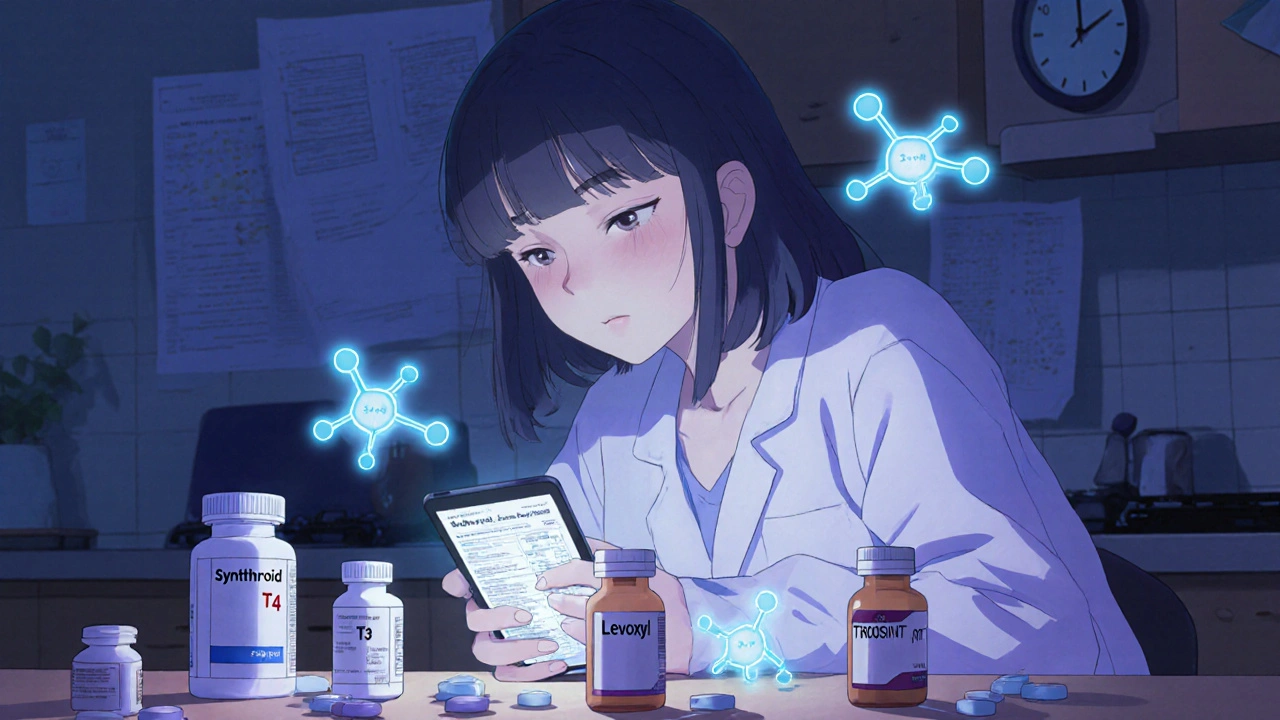Synthroid vs Alternatives: What Works Best for Hypothyroidism in 2025
 Oct, 28 2025
Oct, 28 2025
If you’re taking Synthroid for hypothyroidism, you’ve probably wondered: is this really the best option? Maybe your insurance dropped coverage, your pharmacy ran out, or you’re just not feeling right on it. You’re not alone. Thousands of people in the UK and beyond switch thyroid meds every year-not because Synthroid doesn’t work, but because something else might work better for them.
What is Synthroid, really?
Synthroid is a brand-name version of levothyroxine, a synthetic version of the T4 hormone your thyroid normally makes. It’s been the go-to treatment for hypothyroidism since the 1950s. The FDA approved it in 1997, and since then, it’s been prescribed over 100 million times a year in the US alone. In the UK, it’s widely used through the NHS, though generic levothyroxine is more common.
Here’s the key thing to understand: Synthroid isn’t magic. It’s a precise, consistent dose of T4. The brand’s reputation comes from its strict manufacturing standards. Each tablet contains the exact same amount of hormone-no more, no less. That consistency matters. A 2023 study in the Journal of Clinical Endocrinology & Metabolism found that patients who switched from brand to generic levothyroxine had a 30% higher chance of needing a dose adjustment within six months.
Why do people look for alternatives?
People switch for a few real reasons:
- Cost: Synthroid can cost £60+ per month without insurance. Generic levothyroxine? As low as £4.
- Side effects: Some report bloating, headaches, or heart palpitations-even on the right dose.
- Inconsistent response: You take the same pill every day, but your TSH levels keep jumping up and down.
- Insurance or supply issues: Pharmacies sometimes can’t get Synthroid in stock, or your plan won’t cover it.
It’s not about being ‘anti-brand’. It’s about finding what keeps your energy stable, your mood steady, and your lab results in range.
Generic levothyroxine: the most common alternative
Generic levothyroxine is chemically identical to Synthroid. Same molecule. Same active ingredient. But here’s the catch: the fillers and binders? Different.
These inactive ingredients-like lactose, corn starch, or dyes-don’t affect the hormone itself. But they can affect how your body absorbs it. A 2022 analysis of NHS prescribing data showed that patients who switched from Synthroid to a generic made by a different manufacturer had a 15-20% spike in TSH levels within 8 weeks. That means your thyroid-stimulating hormone went up, suggesting your body wasn’t absorbing the dose as well.
Not everyone reacts this way. Many people switch without issue. But if you’ve been stable on Synthroid for years, don’t switch unless you have to. And if you do switch, get your TSH checked after 6-8 weeks.

Levoxyl and Tirosint: other brand-name options
Levoxyl is another brand of levothyroxine. It’s less common in the UK but available through private prescriptions. Its formulation uses fewer fillers than Synthroid, which some people with sensitivities prefer.
Tirosint is different. It’s a gelcap, not a tablet. That means it’s free of dyes, gluten, lactose, and alcohol. It’s designed for people with allergies, celiac disease, or absorption issues. A 2024 patient survey of 1,200 people with hypothyroidism found that 68% of those who switched to Tirosint reported better energy and fewer digestive symptoms within 30 days.
Downside? Tirosint costs around £90 per month in the UK. It’s not covered by the NHS unless you have a documented intolerance to other forms. But if you’ve struggled with absorption or gut issues, it might be worth discussing with your endocrinologist.
Natural desiccated thyroid (NDT): the controversial option
NDT-meds like Armour Thyroid, Nature-Throid, or WP Thyroid-is made from dried pig thyroid glands. It contains both T4 and T3, the two hormones your thyroid makes naturally. That’s different from Synthroid, which only has T4.
Some people swear by NDT. They say they feel more alert, lose weight easier, and have better mood stability. A 2021 study in the Thyroid journal followed 247 patients who switched from levothyroxine to NDT. 49% reported improved quality of life. Only 14% felt worse.
But here’s the problem: NDT isn’t standardized. The T4/T3 ratio varies between batches. That makes dosing tricky. The NHS doesn’t prescribe it routinely because of inconsistent absorption and lack of long-term safety data. In the UK, it’s only available through private clinics-and it’s expensive, often £80-£120 a month.
Also, NDT can cause heart palpitations or anxiety if the T3 dose is too high. It’s not for everyone. But if you’ve tried everything else and still feel tired, it’s worth a conversation with a thyroid specialist-not just your GP.
Thyroid meds that aren’t alternatives: what to avoid
There’s a lot of noise online about ‘natural thyroid boosters’-seaweed, iodine, ashwagandha. Some people think these can replace medication.
They can’t.
If your thyroid isn’t making enough hormone, no supplement will fix that. Iodine deficiency is rare in the UK. Taking extra iodine won’t help if your thyroid is damaged by Hashimoto’s or surgery. And supplements like ashwagandha? They might help stress, but they don’t raise your T4 levels.
Don’t risk stopping your medication for a trendy supplement. You could end up with severe fatigue, weight gain, or even myxedema coma-a life-threatening condition.

How to decide what’s right for you
There’s no one-size-fits-all thyroid med. Here’s how to make a smart choice:
- Check your TSH and free T4 levels. If they’re stable on Synthroid, don’t fix what isn’t broken.
- Track your symptoms. Keep a simple log: energy, mood, weight, temperature. Note changes after any switch.
- Ask about cost and access. Can you afford the brand? Is it in stock? Will insurance cover it?
- Test after 6-8 weeks. Any change in med needs a blood test. Don’t assume the new dose is right.
- Work with an endocrinologist. Not all GPs are up to date on thyroid nuances. A specialist can help you weigh the pros and cons.
If you’re on Synthroid and feel great? Stick with it. If you’re struggling? You have options. But don’t guess. Test. Track. Talk.
What most patients don’t tell their doctors
Many people stop taking their thyroid meds because they feel worse after switching. They don’t say anything. They think it’s ‘just stress’ or ‘getting older’.
But here’s what’s really happening: when you switch from one levothyroxine brand to another-even if they’re both generic-the fillers change. That can alter absorption. Your body might need 12.5 mcg more or less. That’s not a lot. But for your metabolism? It’s enough to make you feel exhausted, depressed, or foggy.
Don’t suffer in silence. If you notice a change in how you feel after a pharmacy switch, say something. Ask for a blood test. Ask if you can go back to your original brand.
Your thyroid doesn’t care about brand names. But your body does. And you deserve a med that lets you live well.
Can I switch from Synthroid to generic levothyroxine safely?
Yes, many people switch without issues. But because fillers differ between brands, absorption can change. Always get your TSH and free T4 levels checked 6-8 weeks after switching. If your levels shift, your dose may need adjusting.
Is Tirosint better than Synthroid?
Tirosint isn’t necessarily ‘better’-it’s different. It’s a gelcap with no fillers like lactose or dyes, which helps people with allergies or gut sensitivities. If you’ve had trouble absorbing other forms, Tirosint can make a real difference. But it’s more expensive and not routinely available on the NHS.
Why do some people feel better on natural desiccated thyroid (NDT)?
NDT contains both T4 and T3, which some bodies process more naturally than T4 alone. People who’ve struggled with fatigue or brain fog on levothyroxine sometimes report improved energy and mood on NDT. But it’s harder to dose precisely, and it’s not approved for routine NHS use due to variability between batches.
Can supplements replace thyroid medication?
No. Supplements like iodine, selenium, or ashwagandha may support thyroid health, but they cannot replace hormone replacement. Stopping your prescribed med for supplements can lead to dangerous hormone levels and serious health risks.
How often should I get my thyroid levels checked after switching meds?
Get tested 6-8 weeks after any change in brand, dose, or formulation. After that, if your levels are stable, testing every 6-12 months is usually enough. Always test before and after any change.
What to do next
If you’re thinking about switching thyroid meds, start with your doctor. Bring your symptom log, your current dose, and your last blood test results. Ask: ‘Is there a reason I should stay on Synthroid? What are my other options?’
If your GP says no, ask for a referral to an endocrinologist. Thyroid care is complex. You deserve someone who understands the nuances-not just the guidelines.
And if you’re doing fine on Synthroid? Keep taking it. It’s worked for millions. But if you’re not? You’re not alone-and you don’t have to settle for feeling off.

Susan Karabin
October 28, 2025 AT 16:39Been on Synthroid for 12 years and honestly never thought twice about it until my pharmacy switched me to generic and I felt like a zombie for six weeks
Turns out my body just needed the consistency
Now I ask for the brand by name every time and they know me by sight
Not saying everyone needs it
But if you feel off after a switch
Don’t ignore it
It’s not all in your head
It’s the fillers
The tiny differences that add up
My TSH jumped 2 points
That’s not nothing
Trust your body more than the algorithm
Shilah Lala
October 30, 2025 AT 04:32Oh look another post telling people to stick with Big Pharma
Meanwhile NDT has been helping people for decades
The NHS doesn’t approve it because they don’t want to pay for it
Not because it’s dangerous
They’d rather keep you tired and on a pill that doesn’t work
Classic
Sarah Schmidt
October 30, 2025 AT 15:19I switched to Tirosint last year after 8 years of Synthroid and the difference was night and day
No more bloating
No more brain fog
No more random heart flutters
I have celiac and the gluten-free gelcap made all the difference
My doctor was skeptical
Said it was just placebo
Then I showed him my labs
Free T4 went up 1.2 points
TSH dropped from 4.8 to 1.9
He still muttered something about cost
But now he refers people to me
It’s not magic
It’s just chemistry that actually works for your body
And yes it’s expensive
But I’d pay triple for this kind of clarity
Jen Taylor
October 31, 2025 AT 20:09For anyone considering NDT: please, please, please get tested before and after
I went from 75mcg Synthroid to 60mg Armour
Thought I’d finally feel alive
Turned out my T3 was through the roof
Heart racing at 3am
Anxiety so bad I cried over spilled coffee
Took me 3 months to stabilize
And I had a great endo guiding me
Don’t go off half-cocked
NDT isn’t a magic bullet
It’s a scalpel
And scalpel needs a skilled hand
And patience
And blood tests
Lorena Cabal Lopez
November 1, 2025 AT 17:19Supplements don’t work
End of story
Stuart Palley
November 2, 2025 AT 11:34Generic levothyroxine is a scam
Big Pharma knows people will switch for cost
So they make the fillers unpredictable
Just enough to make you feel bad
So you go back to Synthroid
And pay more
It’s not about your health
It’s about profit
I’ve seen it
My cousin switched
Got sick
Went back
Insurance paid for Synthroid
Everyone wins except the patient
Sage Druce
November 2, 2025 AT 20:23If you’re on Synthroid and feel fine
Don’t touch it
But if you’re struggling
There are options
And you’re not crazy for wanting to feel better
Thyroid issues are invisible
People think you’re lazy
Or depressed
Or just not trying
But your metabolism is broken
And no amount of yoga or kale will fix that
Find your person
Find your med
And fight for it
You deserve to feel like yourself again
STEVEN SHELLEY
November 4, 2025 AT 02:16Did you know the FDA allows 5% variation in generic levothyroxine
That means your 100mcg pill could be 95 or 105
And they don’t even test every batch
They just trust the manufacturer
And the manufacturer? They outsource to India
Where the water quality is trash
And the inspectors are paid off
So you’re basically gambling with your hormones
And your life
And they call it healthcare
What a joke
Patrick Dwyer
November 4, 2025 AT 02:45As someone who works in endocrinology
I see this every day
The most important thing isn’t the brand
It’s consistency
Take the same pill at the same time every day
Wait 30-60 minutes before eating
Don’t take it with calcium or iron
And get your labs done at the same lab
Because different labs have different reference ranges
And that’s often where the confusion starts
It’s not always the med
It’s the context
So before you switch
Ask yourself
Am I doing everything right with what I have?
luna dream
November 4, 2025 AT 12:42They’re all controlled by the same few corporations
Synthroid
Tirosint
Armour
Same owners
Same profit margins
They want you to think you have choices
But really
You’re just picking which flavor of the same poison to take
And they’ll sell you the expensive one
Because they know you’re desperate
And desperate people pay more
It’s not medicine
It’s a trap
Linda Patterson
November 5, 2025 AT 22:50Anyone who says NDT is better hasn’t read the studies
The T4/T3 ratio is all over the place
Some batches have 2x the T3
That’s not medicine
That’s Russian roulette
And the NHS doesn’t cover it because they’re not idiots
They’ve seen the ER visits
The atrial fibrillation
The panic attacks
People think they’re being ‘natural’
But they’re just being reckless
And then they blame the system when they crash
Tyler Mofield
November 7, 2025 AT 12:10It is axiomatic that pharmacokinetic variability in levothyroxine formulations constitutes a clinically significant confounder in endocrine management
Multiple peer-reviewed studies have demonstrated that substitution between non-bioequivalent formulations may result in suboptimal thyroid hormone homeostasis
Consequently, persistent TSH fluctuations post-switch necessitate vigilant laboratory monitoring
It is therefore ethically imperative that clinicians prioritize formulation stability over cost containment
Furthermore
the commodification of endocrine therapeutics via generic substitution represents a systemic failure of regulatory oversight
One which compromises patient autonomy
and undermines the principle of beneficence
Christy Tomerlin
November 8, 2025 AT 09:40My doctor told me to switch to generic
I said no
He said I’m being difficult
I said I’m being smart
He said Synthroid is overpriced
I said my energy isn’t
He said I’m lucky to have insurance
I said I’m lucky to have a body that works
So I paid out of pocket
And I’ve never felt better
And if you’re telling me to save money
Then you’re telling me to be tired
And I’m done with that